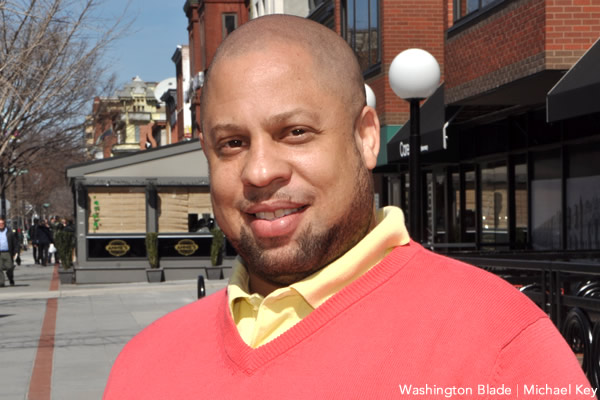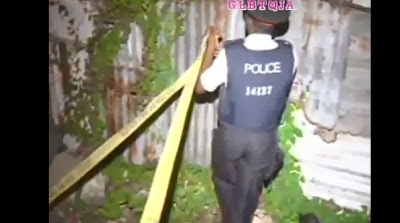What do you make of this? I hope they were able to raise funds to deal with the homeless shelter that is yet to materialize following the November 2012 town hall meeting announcement while the men still languish on the street and the reported eviction notice from their present location along with their parent NGO Jamaica AIDS Support for Life in part due to the behaviour of the homeless MSM in New Kingston but also the sale of the property.
Things have gotten serious so much so that the men now gather at the rear of the JFLAG office much to the annoyance of the neighbours and others as the police and local authorities crack down on the men's movements given the repeated public spectacle over the past 4+ years since the dubious closure of the Safe House Project that the group never protested when the ultimatum was given for the then populations to leave.
The Washington Blade reported:

Dane Lewis, executive director of Jamaica Forum for Lesbians, All-Sexuals and Gays, was visiting a gay friend in Kingston, the country’s capital, on a Sunday night in the late 1990s when a group of men slashed three of his car’s tires.
A mob had already formed when he told his friends who were inside the house that they needed to leave. The men eventually stole Lewis’ car — and a friend who was sitting in the backseat still has shards of glass in his arm after they broke a window.
“We took a girlfriend with us, which we thought would have been a good cover, but that clearly didn’t work,” Lewis told the Washington Blade on Sunday before he attended a D.C. Center-organized mixer at Larry’s Lounge in Dupont Circle. “The community already had an issue with the guy that we went to see and obviously reacted because he had friends that the others thought were gay coming to visit.”
Lewis, who has been with J-FLAG since 2007, spoke with the Blade roughly two months after he appeared in a public awareness campaign designed to promote greater acceptance of LGBT Jamaicans.
He said reaction to the “We Are Jamaicans” campaign have been “thankfully very positive,” but he has received some negative feedback. This includes a threatening note left on his car outside his Kingston home that read “Batty man for dead” or “Gay man should be murdered” in Jamaican slang.
“We are claiming space in a way that they think we really should keep our lives private and behind closed doors,” Lewis said. “That sadly has been just the way that LGBT people are expected to play to survive in a culture like ours. They would obviously find it offensive that people are being so comfortable with their orientation and the need to speak openly about their realities.”
J-FLAG has faced a number of challenges since its 1998 founding.
A man stabbed Brian Williamson, the organization’s co-founder, to death inside his Kingston home in 2004. Former J-FLAG executive director Gareth Henry sought asylum in Canada in 2008 after he received death threats.
A J-FLAG report said the organization knows of at least 30 gay men who have been murdered in Jamaica between 1997 and 2004. Authorities found British diplomat John Terry strangled to death inside his home near Montego Bay in 2009 — they found a note left next to his body that referred to him as “batty boy.”
The State Department, Human Rights Watch and other groups have criticized the Jamaican government for not doing enough to curb anti-LGBT violence on the island. J-FLAG is among the organizations that have blasted Buju Banton, Elephant Man, Sizzla and other reggae and dancehall for lyrics they contend insight anti-gay violence.
In spite of these challenges, Lewis notes the country’s LGBT rights movement has seen some advances in recent years.
Jamaican singer Diana King came out as a lesbian last summer in a post to her Facebook page. Beenie Man in the same year apologized for his anti-gay song lyrics.
Prime Minister Portia Simpson said shortly before her Dec. 2011 election her government would review the country’s anti-sodomy law. It has yet to do so, but the Jamaica Supreme Court in June will hear a case that challenges the colonial-era statute on grounds it violates a constitutionally-guaranteed right to privacy.
“It will be a very interesting case to watch,” Lewis said. “It will give a better sense of where the courts are at in terms of protecting the rights of gay, lesbian, bisexual and transgender people.”
Lewis spoke with the Blade a day before Queen Elizabeth II signed a Commonwealth charter with an anti-discrimination statement that reportedly includes an implicit reference to gay men and lesbians. He said President Obama’s statements in support of LGBT rights and same-sex marriage have had a positive effect in Jamaica.
“What it has done has opened up a debate for us around the issue of rights and whether same-sex marriage needs to be on the table,” Lewis said.
Lewis remains optimistic this progress will continue in the years to come.
Health Minister Dr. Fenton Ferguson in December said lawmakers should repeal the country’s anti-sodomy law. A January sexuality symposium included LGBT-specific information, but a recent J-FLAG report found only 17 percent of Jamaicans tolerate gay men and lesbians.
A video showing a mob at a Jamaican university attacking a student whom they reportedly caught in a “compromising position” with another man in a bathroom went viral last November. The clip captures two security officers beating the man while the crowd calls him “batty boy.”
J-FLAG statistics note one third of Jamaicans feel the government has not done enough to protect their LGBT countrymen. Lewis said the Nov. 2012 incident and others like it help “generate the conversation” about gay and lesbian rights in the country.
“We need to capitalize on that energy and begin to have some public discourse,” he said.




.mkv_000108708.jpg)
.mkv_000109059.jpg)
.mkv_000113988.jpg)















+(Light).jpg)











+Cartoon+on+Rowdy+Homeless+MSM.jpg)































0 comments:
Post a Comment